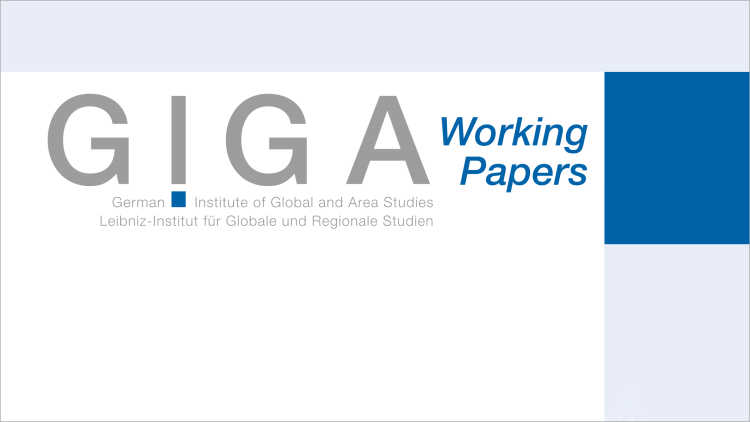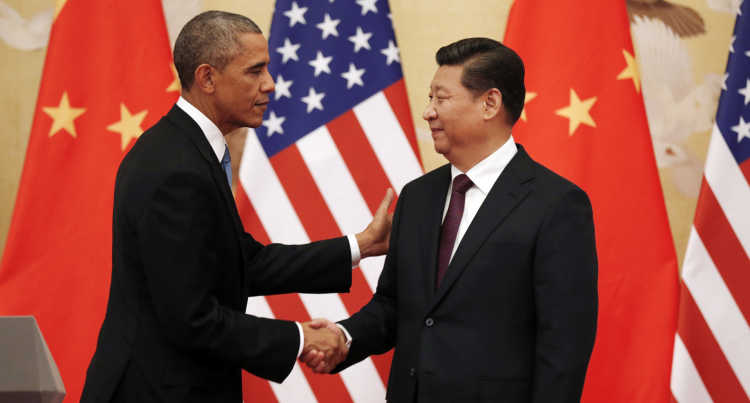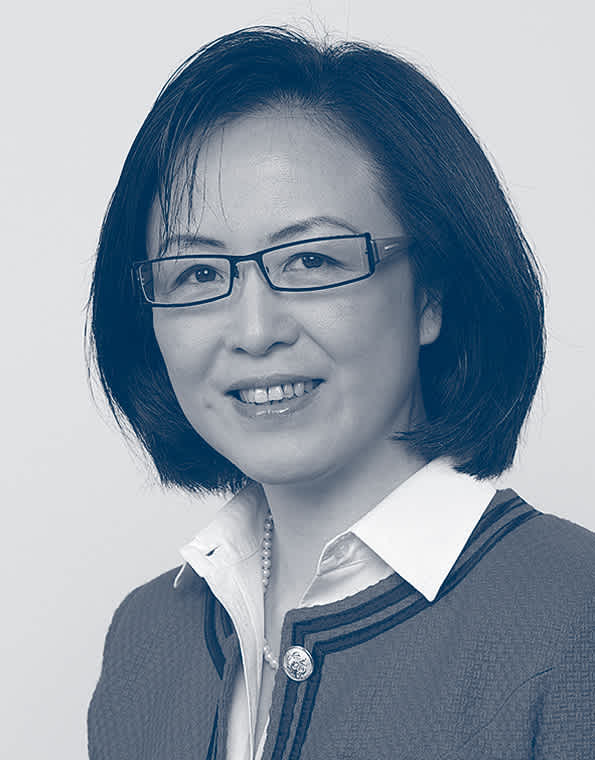- Home
- Publications
- GIGA Focus
- "He who says C must say D" — China’s Attempt to Become the "World’s Largest Democracy"
GIGA Focus Asia
"He who says C must say D" — China’s Attempt to Become the "World’s Largest Democracy"
Number 2 | 2016 | ISSN: 1862-359X

For more than a decade the People’s Republic of China has been perceived as a competitor governance model to Western democracy. Since the new leadership under Xi Jinping started to internationally position China as the “world’s largest democracy,” it has been challenging the West’s prerogative of interpretation of political order.
As its international significance has grown, China’s demands for an equal position in the global competition over values and discourse have increased. In pursuing interpretation aspirations with regard to sociocultural values and political order, China has started to challenge the perceived discourse hegemony of the United States and the West.
China’s claim to be the “world’s largest democracy” is linked to its belief that the Chinese political system should not simply be another democratic system, tailored to its national conditions; rather, in comparison to India, which in the West is considered the biggest democracy, China should be the “truest” and most economically successful democracy thanks to numerous participation mechanisms.
The new interpretation of China’s political system is linked to long-standing debates amongst Chinese elites about the socialist party-state’s characteristics, achievements and deficits, and summarises them confidently and pointedly. At the same time, China’s self-description as a "democracy" corresponds well with the self-image of many Chinese people.
China’s pursuit of international prerogative of interpretation is in line with domestic goals. The assertion of discourse power strengthens the supporters of a "democracy with Chinese characteristics,” on the one hand, and presents an implicit threat to critics of the domestic political system, on the other.
Policy Implications
Many Western observers are likely to dismiss China’s official attempts to position itself as the “world’s largest democracy” as nonsensical and implausible. However, an examination of the underlying demands for discourse power would appear necessary, not only from the perspective of a pluralistic approach – which as such takes alternative worldviews seriously. The “factual power of the normative” must also be taken into account if such alternative governance discourses and values are to be introduced internationally as power resources.
From Autocratic to “Democratic” Competitor Model?
It is almost 10 years since German politicians identified the People’s Republic of China as a competitor governance model to Western democracy. In the fall of 2007, the CDU/CSU parliamentary group framed its new Asian strategy as follows: “In China we see an undemocratic non-liberal state rising up the global economic and political hierarchy. Moreover, it is developing into a model of economic governance for other states, which puts it in competition with the West” (Von Klaeden 2007). Back then, combining a “modern authoritarian” political system with an “(early) capitalist” economic system was deemed one of the biggest strategic challenges for Germany and Europe. As recently as March 2016, Francis Fukuyama – author of the 1989 essay “The End of History” – echoed a similar stance, stating that “China is a real test case. It is the only alternative to a liberal, capitalist democracy. The country is technically and economically advanced – but it pursues modernization without democracy” (Die Zeit 2016). In comparison with the CDU/CSU’s 2007 Asian strategy, Fukuyama’s paints a negative picture of Western, liberal democracy. According to Fukuyama, not only have Western elites failed in the last two decades, they are not up to engendering pride, solidarity, or identity (Ibid.).
As these two assessments show, China’s claim of autocratic success and of being a competitor governance model to Western democracy is nothing new. However, what has changed in the West over the last decade is the growing malaise regarding the state of Western democracy. With this shift in the self-perception of Western states, there is a corresponding shift in the self-perception of China – with a surprising twist for Western observers: after some initial hesitation, China’s political and intellectual elites have gotten used to the attributions of an economically successful competitor model to the West, though not under the auspices of an “undemocratic,” “authoritarian,” “illiberal” system. After a decade of experimenting with various concepts and institutional variants of “democracy,” the Chinese state media have recently set about actively and explicitly positioning China as a “democracy.”
As this paper argues, this offensive points to a growing endeavour on the part of the Chinese leadership to secure an equal position in the global competition over values and discourse. Since Xi Jinping became head of the Chinese Communist Party (CCP) and state president, the Chinese leadership has above all pursued a firm soft-power strategy and has challenged the West’s prerogative of interpretation of sociocultural values and political order. From the perspective of Western democracies, China’s aspirations to join the ranks of the “democratic” community may seem absurd. However, it is evident that China’s self-description as a “democracy” not only corresponds to the self-image amongst Chinese citizens, it is also part of its pursuit of the international prerogative of interpretation and other domestic goals. In the following sections both dimensions (foreign and domestic) of China’s attempt to become a “democracy” will be discussed and possible repercussions for the global competition over values and political order will be assessed.
China’s International Positioning as a “True” Democracy
The term minzhu (“democracy”), which was adapted to the Chinese language from Japanese in around 1900, is not considered an alien concept in party theoretical, academic, or public discussions in China. In fact, “democracy” has an altogether positive connotation in Mao Zedong’s historical treatises on “new democracy” amongst social elites who fought for national emancipation alongside the CCP in the civil war; in the Leninist principle of “democratic centralism,” which determined the establishment of the National People’s Congress as the embodiment of popular sovereignty under the leadership of the CCP; and in the numerous reform-period experiments that have been initiated, such as village elections, competitive intra-party elections, and deliberative and consultative democracy. In China “democracy” is only clearly distinguished from liberal-democratic multiparty systems based on contentious elections, which in official documents are considered irreconcilable with “socialist democracy with Chinese characteristics” to this day. Against this background, it is unsurprising that “democracy” – as well as terms like “prosperity,” “harmony,” “freedom,” “justice,” and “rule of law” – has been nationally propagated since 2013 as 1 of 12 “socialist core values.”
Since Xi Jinping was selected as the new “strong man” following a decade of perceived reform standstill under Hu Jintao (2002–2012), one new development that has certainly been observed is the active positioning of China as a high-grade, successful democratic system – with comparisons being drawn with other democracies, especially Western ones. During the run-up to the 18th Party Congress, Chinese television disseminated a short video titled “How Leaders Are Made.” The clip compares the way in which the US and Chinese presidents execute their respective offices and how leaders rise to power. It caricatures the US process as consisting of drawn-out and costly election campaigns, political compromises, and the overriding importance of the final act of voting. In contrast, the Chinese process is depicted as selecting leaders on the basis of merit and skills that new leadership candidates earn over the course of long political careers in which they would have faced various acid tests. The clip concludes that “Many roads lead to national leadership, and every country has one for itself. Whether by a single ballot that gets the whole nation out to vote or by meritocratic screening that requires years of hard work like the making of a kung fu master, as long as people are satisfied and the country develops and progresses as a result, it’s working” (“How Leaders Are Made” 2012). Although the term “democracy” is not used in the clip, it invokes central elements thereof, such as public interest and popular consent, and symbolically substitutes the electorate with the 85 million members of the CCP.
Another example of China’s assertion of discourse power is a June 2014 column titled “Beware of the Trap of Western-Style Democracy,” which appeared in the People’s Daily. According to the columnist, the 2013–14 protests in Ukraine and Thailand – and, though not explicitly identified, the “Occupy” movement in Hong Kong in 2014 – reveal the dangers of democratic “street politics.” He also criticises what he sees as the trend towards full Westernisation and the blind copying of Western norms. He contends that China has recognised that the unquestioned acceptance of “universal values,” which actually appear to be Western values, is wrong and would lead to disaster (Mi 2014).
In August 2015 the party-controlled Global Times (Huanqiu Shibao) ran the following headline: “Which Is Ultimately the Largest Democratic Nation?” (Han 2015). The author of the article was Han Zhen – former president and now party secretary of the Beijing Foreign Studies University, and head of the university’s Coordination and Innovation Centre for the Dissemination of Chinese Culture. In the article Han criticises the West, above all the United States, for attempting to exclude China from the global values discourse for being “undemocratic.” In contrast, India – which in the eyes of the West is the “world’s largest democracy” – enjoys a normatively biased level of trust, which he contends cannot be justified. Han argues that against this background, it is time for China to break free from the “discourse trap” and secure the prerogative of interpretation of global values as well as of the essence of democracy. For Han, it is necessary to clarify that “democracy” is a historically formed term that has developed differently in various epochs and regions and for which there are no fixed standards. He argues that the Arab Spring has shown that the Western democratic model is not compatible with other cultural contexts. The lesson to be learned is that without stability and order, neither prosperity for the people nor civilisational progress will be achieved. Han claims that the Chinese political system is not seeking to simply join the ranks of the world’s other democratic systems, but rather to represent, in comparison with the others, a “true” and “effective” democracy. He points out that unlike in many façade democracies, China ensures that the different ethnic groups and social strata in the political process and in the recruitment of competent leaders are adequately represented. Moreover, unlike in “certain states” the Chinese people do not only have the choice between different “political dynasties” and their capitalist backers on election day, instead they are involved every day in a number of important decision-making processes through a range of consultative mechanisms. According to Han, particularly in grassroots-level democratic consultations, socialism with Chinese characteristics has been proven to represent the true interests of the people, and the country’s economic success proves the vitality of the democratic system; thus China can justifiably be considered the “largest democratic nation.” For Han, it is now time for China to make this clear and no longer silently accept its (inaccurate) undemocratic image (Ibid.).
Geopolitical Interests and Criticism of Western “Discourse Hegemony”
The repeated attempts of the party-state media to position China amongst the world’s democracies raise questions about the foreign policy motives behind these efforts. As indicated in the article by Han Zhen, the growing competition with India could well play a role. After all, these two emerging Asian countries are increasingly competing for regional power status. At the level of the global values debate, China faces growing efforts by the Indian leadership to exclude China from certain initiatives and forums for being “undemocratic.” Since 2003 India has also been looking to secure its own free trade agreement with Brazil and South Africa within the IBSA Initiative accompanied by various working bodies in the fields of agriculture, defence, and public administration. Although all three countries belong to the BRICS group and the BICS format (without Russia), within the IBSA framework India is calling for a common “democratic” basic understanding, which therefore a priori excludes China (Stuenkel 2015). Such competition between the two also exists within Asia – for instance, Myanmar’s more recent democratisation efforts have seen China’s political influence curtailed in favour of India’s.
Above all, the Chinese leadership has become increasingly concerned by the intensification of the US–Indian alliance. Since Bill Clinton visited India in 2000 – the first president to do so for 22 years – the two countries have rapidly moved closer together on the basis of shared economic and geopolitical interests. Furthermore, India and the United States held four strategic rounds of dialogue between 2010 and 2013. Thus from China’s viewpoint, this bilateral relationship has gone to another level (Huang 2014). A similar convergence can also be noted between India and Japan, with whom China also has an increasingly tense relationship. Against this background, and with regard to geopolitical interests, the Chinese leadership may have sufficient motive to take measures against alliances between Western and Asian democracies and even against the scenario of a “concert of democracies” from which China and Russia would be excluded, as has been repeatedly articulated by US observers since 2004.
Furthermore, Chinese criticisms of the West’s “discourse hegemony” with regard to global values and governance norms should be taken seriously. In the wake of the global financial crisis, from which China emerged relatively unscathed in comparison with the United States and Europe, such critical voices have become increasingly vocal. Rather than passively accepting the hitherto perceived Western dominance in internal debates on human rights, the rule of law, freedom of the press, and democracy, since 2010 Chinese political and intellectual elites have been increasingly calling for equal standing in the global competition over values and discourse power. A CCP resolution from the fall of 2011 called for the strengthening of the country’s cultural soft power, while “Document No. 9” from early 2013 (originally, an internal party document) explicitly distanced the CCP from the idea of “universal values,” which it deems as nothing more than dominant Western values, which are instrumentalised by “hostile forces” to weaken China internationally. With its recent attempt to become the “largest” democracy in the world, China’s party-state elites are simultaneously asserting China’s aspirations: to go from rule-taker to rule-maker.
Reorientation of the Internal Debate on Chinese Democracy
The new interpretation of the Chinese political system ties in with debates about the characteristics, achievements, and problems of the socialist party regime that have been carried out for years amongst domestic elites. Following the end of socialism in Eastern Europe, China could not withdraw from the global political discourse about the advantages of democracy despite the government’s crackdown on the democracy movement in June 1989. Within the CCP there are those, above all retired party veterans, who are pushing for liberal-democratic reforms; they are opposed by those who believe democracy will only lead to chaos. Some point out that there are various paths to democracy and that the West needed several hundred years to develop its current political system, whereas China still finds itself in a learning process. Particularly intensive discussions took place around the time of the 17th Party Congress in 2007, which confirmed the leadership of Hu Jintao and Wen Jiabao. In 2005 the government published a White paper titled “The Building of Political Democracy in China.” This was followed in 2007 by another White paper titled “China’s Political Party System,” which proposed a harmonious, “consultative” cooperation between several “democratic” parties under the leadership of the CCP as an alternative to Western-style party politics. In the same year, a group of prominent researchers from the Central Party School published “Storming the Fortress: A Research Report on Reform of China’s Political System” after the 17th Party Congress, which made recommendations for the comprehensive reform of the political system (Zhou et al. 2007).
However, the dynamic of this debate had already begun to subside after the CCP failed to make a decision on big political reforms at the 17th Party Congress. Instead, the CCP leadership concentrated on individual measures intended to improve and secure its rule, especially at the local level. These measures focused on “intra-party democracy” and the introduction of competitive elections of party committees (more candidates than seats), more transparency and, in turn, greater control of local governments (“open government”), and direct elections of village committees. Under the label “consultative democracy” participatory elements were established as “input institutions,” such as advisory governmental institutions, public hearings on legal texts, and the promotion of a more people-oriented “working style.” At this time, however, the leadership – Premier Wen Jiabao in particular – gave the impression that they still considered democracy to be a universal value, which in capitalist and socialist countries simply took different forms, and that “democracy with Chinese characteristics” would continue to develop.
One impulse for the debate on the degree and form of democratisation in China was the assessment of the fall of the Soviet Union. This had long been attributed to insufficient flexibility towards participatory and responsive forms of government. However, Xi Jinping drew a completely different conclusion: the failure of the Soviet Union was the result of a lack of stability within the Soviet party regime. Unlike under Hu and Wen, the “universality” of values was now considered a rallying cry of the West. Instead of democratic reforms, the fight against corruption became the centrepiece of policy reforms. Yet in China, no one seems to doubt the normative power of democracy. No party or government programme is agreed if it does not contain a section on democracy. In 2013 the leadership recommended for general reading the bestseller The China Wave: Rise of a Civilizational State by Zhang Weiwei, a professor of international relations at Fudan University, which argues that multiparty democracy is unsuitable for China. Zhang also explains that the democracy-versus-autocracy discourse is outdated. He argues that the question of “good governance” is more decisive, which is an area in which Western states can also still improve (Tatlow and Zhang 2015; Zhang 2015).
Han Zhen follows this logic, contending that China must no longer explain why it is not yet ripe enough for democracy. He argues that it can confidently stand by its own form of democracy, thus appearing to suggest it can now do without the use of adjectives (like “consultative”). Other intellectuals share Han’s opinion, claiming that they also see a “long-standing” and “true democracy” in China (Tian 2015). This view is likely to receive support amongst the Chinese population. In various analyses international researchers have shown that a substantial proportion of Chinese citizens are in favour of personal freedoms, which are generally seen as a result of democracy, but at the same time have shown little commitment to the realisation of political freedoms such as the right to protest or organise and have no interest in a multiparty political system in China. This is especially true for the middle class, on whose desire for political representation modernisation theorists base their optimism that authoritarian states will sooner or later inevitably experience a transformation (Chen and Lu 2011).
At the same time, not only is trust in the central government and the party leadership very high, but large sections of respondents also believe that China is already a democratic country (Lu and Shi 2014; Shi 2008). This initially surprising result can be explained by the answers given to questions respondents were additionally asked about the meaning of democracy. For many Chinese respondents, their understanding of democracy is not so much based on Western standards of multiparty systems or free elections but rather on whether the government represents the interests of the people. Thus they are less concerned about the exercise of democracy and more concerned by the results of governance – that is, whether the government can ensure a stable environment for social, economic, and political development and growing prosperity for the population. This “populist” understanding of “guardianship democracy” (“as long as the government is a good government, it is democratic”) was once championed in the mid-1990s by advocates of “Asian values.” It corresponds with the convictions of those who promote a “Chinese model,” according to which a meritocratic form of democracy is ideal for China (Lu and Shi 2014; Pan 2010). These messages, which clearly support party rule in China, are promoted by the education system and through “positive propaganda” in the media. At the same time, reference is repeatedly made to the “chaotic” results of Western democracy, whether in Hong Kong or in US election campaigns.
Warning to the Critics of Chinese “Democracy”
The confident reorientation of the democracy discourse in China has yet another component: China is already a “true” and effective democracy. This belief, expressed by Han, means that those who doubt China’s democratic character are seen to be aligning themselves with the “enemies of the Chinese people.” It is not a new notion that both inside and outside of China enemy forces (such as separatists, terrorists, and cyber criminals) are intent on ending CCP rule. What is new is the assertion that these “enemy forces” are behind virtually all of China’s problems, whether it be the slump in the stock markets, growing labour protests, social scientists highlighting Mao’s mistakes, or corruption in the armed forces (Economy 2015). The claim by the Chinese education minister, Yuan Guiren, that young teachers and students are the primary targets of foreign infiltration attempts caused a big stir at the beginning of 2016. According to Yuan, it is for that reason that Western concepts such as the rule of law, civil society, and human rights should be banned from textbooks.
By portraying each doubter of the Chinese concept of democracy as a potential enemy, the quest for international prerogative of interpretation within democracy discourse remains in line with domestic political goals. The assertion of discourse power with regard to the democracy question should, on the one hand, strengthen the supporters of the “Chinese model” and, on the other hand, serve as an implicit warning to the supporters of liberal democracy in China to no longer oppose official prerogative of interpretation of the “Sino-socialist” set of values – to which democracy and rule of law in fact do belong. The 2015 amendment of the National Security Law supports this warning as does the Law on Foreign Non-governmental Organisations, which was passed in April 2016. The latter places each Chinese institution that receives funding from foreign donors, even from foundations or universities, under general suspicion of being a security threat.
From Rule-Taker to Rule-Maker
It is likely that many in the West will dismiss China’s attempt to become the “world’s largest democracy” as nonsensical and implausible. China’s attempt to reframe its own political system – which all global indices of democracy measurement consistently rank as unequivocally authoritarian – as a democracy may seem an absurd effort at self-legitimation by a democratically illegitimate party regime. Nevertheless, the message underlying this endeavour should be taken seriously for several reasons.
First, it is always important to take into account the self-views and worldviews of actors in different regions, which are becoming increasingly important in a context of changing international power constellations. Along with India, Russia, Brazil, and other emerging economies, China is amongst the most important rising powers. It is evident from an ethical as well as from a pragmatic perspective that a pluralistic approach to globalised research has to deal with the self-perceptions, discourses, and values of these increasingly important global players in their specific historical and cultural contexts (Narlikar 2016). It is not a question of exaggerating these discourses and values in essentialist terms or even euphemising official attempts of political self-legitimation; rather, it is about using context-sensitive understandings of the self-perceptions and worldviews of major global players to better assess additional political, social, and economic development prospects, as well as behavioural options and negotiation options, at the international level.
Second, China’s positioning as the “world’s largest democracy” represents an almost ironic response to the continued widespread expectation amongst Western actors that the party regime will sooner or later undergo democratisation in the wake of economic modernisation. As analyses of internal political debates in China show, a veritable sterilisation of the demands for Western-style liberal-democratic reforms goes hand in hand with the party-state’s monopolisation of interpretation of “democracy.” At the same time, the confidence of the party leadership in its own concept of democracy is based on the widespread belief amongst the Chinese population that democracy is realised when a “good government” adequately and effectively represents the people’s interests.
Third, at the international level the Chinese leadership now appears to place considerable importance on vociferously protesting against the long-standing and painful “discourse hegemony” of the West. Thus, one should expect that China will continue to increasingly demand an equal position in the global competition over values and discourses. In fact, since Xi Jinping took office, there have been a growing number of signals that China is preparing itself, at least regionally, to go from being a rule-taker to being a rule-maker – whether this is through the New Silk Road initiative, the establishment of the New Development Bank, or the Asian Infrastructure Investment Bank – all of which have put the established international organisations in their place.
Finally, the alternative governance discourses and values clearly represent an increasingly hard currency in times of emerging geopolitical alliances. China’s rejection of the perceived “discourse hegemony” could represent an attractive model for actors in other regions, who could have sufficient reason to accept China as an alternative international rule-maker and, possibly, also as a “democratic” leader.
Footnotes
References
Chen, Jie, und Chunlong Lu (2011), Democratization and the Middle Class in China: The Middle Class’s Attitudes toward Democracy, in: Political Research Quarterly, 64, 3, 705-719.
Die Zeit (2016), Die Demokratie stiftet keine Identität. Ist das Modell des Westens am Ende? Ein Gespräch mit dem amerikanischen Politikwissenschaftler Francis Fukuyama, 17 March 2016 (22 April 2016).
Economy, Elizabeth C. (2015), China‘s Stock Market Crash Scapegoat: „Hostile Foreign Forces“, in: The National Interest, 9 July, www.nationalinterest.org/blog/the-buzz/chinas-stock-market-crash-scapegoat-hostile-foreign-forces%E2%80%9D-13293 (3 May 2016).
Han, Zhen (2015), Jiujing shei shi zuidade minzhu guojia (Which is Ultimately the Largest Democratic Nation?), in: Huanqiu Shibao (Global Times), 27 August, http://opinion.huanqiu.com/opinion_world/2015-08/7361939.html (28 August 2015).
"How Leaders are made" – viral Chinese propaganda video, first transmittes on 14 Oktober 2012, www.youtube.com/watch?v=M734o_17H_ A&list=PLKi_tQwu6ENebg3jveuR8IcfvhHbgZ1jQ&index=1 (10 April 2016).
Huang, Zhengduo (2014), The Success and Limitation of India’s Multilateral Diplomacy, 26 January, China Institute of International Studies (CIIS) (22 April 2016).
Lu, Jie, und Tianjian Shi (2014), The Battle of Ideas and Discourses Before Democratic Transition: Different Democratic Conceptions in Authoritarian China, in: International Political Science Review, DOI: 10.1177/0192512114551304: 1-22.
Mi, Bohua (2014), Jingti xishi minzhu xianjing (Watch Out for the Trap of Western-style Democracy), in: Renmin Ribao, 9 June, http://paper.people.com.cn/rmrb/html/2014-06/09/nw.D110000renmrb_20140609_3-04.htm (10 June 2014).
Narlikar, Amrita (2016), „Because They Matter“: Recognise Diversity—Globalise Research, GIGA Focus Global, 1, www.giga-hamburg.de/en/publications/11565749-because-they-matter-recognise-diversity-globalise-research/ (29 April 2016).
Pan, Wei (2010), Western Model Not Universal Prescription for Development, in: Global Times, 4 March, www.globaltimes.cn/content/509794.shtml (18 January 2016).
Shi, Tianjian (2008), China: Democratic Values Supporting an Authoritarian System, in: Chu, Yun-han et al. (eds), How East Asians View Democracy, New York und Chichester: Columbia University Press.
Stuenkel, Oliver (2015), Why Modi Should Resuscitate IBSA, 17 February, in: Post-Western World, www.postwesternworld.com/2015/02/17/should-resuscitate-ibsa (22 April 2016).
Tatlow, Didi Kirsten, and Weiwei Zhang (2015), Q. and A.: Zhang Weiwei on Why China Will Succeed Under the Communist Party, in: The New York Times, 12 June (18 January 2016).
Tian, Wenlin (2015), Shehuizhuyi guojia gengyou keneng shixian zhen minzhu (Socialist Countries Enjoy Even Better Prospects to Realize a True Democracy), in: Jingji Daokan, 3, http://myy.cass.cn/rdpl/201511/t20151122_2707252.shtml (15 January 2016).
Von Klaeden, Eckart (2007), Asien als strategische Herausforderung und Chance für Deutschland und Europa. Asienstrategie der CDU-CSU-Bundestagsfraktion, Beschluss vom 23. Oktober 2007, www.cducsu.de/sites/default/files/asienstrategie_web.pdf (22 April 2016).
Zhang, Weiwei (2015), Jiaoshou: Zhongguo shi fanrongde minzhu guojia, Deguo shi luohoude zhuanzhi guojia (Professor: China is a Prospering Democratic Country, Germany is a Backward Authoritarian Country) (15 January 2016).
Zhou, Tianyong, Changjiang Wang and Anling Wang (2007), Gongjian: Shiqida hou Zhongguo zhengzhi tizhi gaige yanjiu baogao (Storming the Fortress: A Research Report on China's Political System Reform After the 17th Party Congress), Xinjiang: Xinjiang Production and Construction Corps Press.
General Editor GIGA Focus
Editor GIGA Focus Asia
Regional Institutes
Research Programmes
How to cite this article
Holbig, Heike, and Günter Schucher (2016), "He who says C must say D" — China’s Attempt to Become the "World’s Largest Democracy", GIGA Focus Asia, 2, Hamburg: German Institute for Global and Area Studies (GIGA), http://nbn-resolving.de/urn:nbn:de:0168-ssoar-47027-4
Imprint
The GIGA Focus is an Open Access publication and can be read on the Internet and downloaded free of charge at www.giga-hamburg.de/en/publications/giga-focus. According to the conditions of the Creative-Commons license Attribution-No Derivative Works 3.0, this publication may be freely duplicated, circulated, and made accessible to the public. The particular conditions include the correct indication of the initial publication as GIGA Focus and no changes in or abbreviation of texts.
The German Institute for Global and Area Studies (GIGA) – Leibniz-Institut für Globale und Regionale Studien in Hamburg publishes the Focus series on Africa, Asia, Latin America, the Middle East and global issues. The GIGA Focus is edited and published by the GIGA. The views and opinions expressed are solely those of the authors and do not necessarily reflect those of the institute. Authors alone are responsible for the content of their articles. GIGA and the authors cannot be held liable for any errors and omissions, or for any consequences arising from the use of the information provided.

















